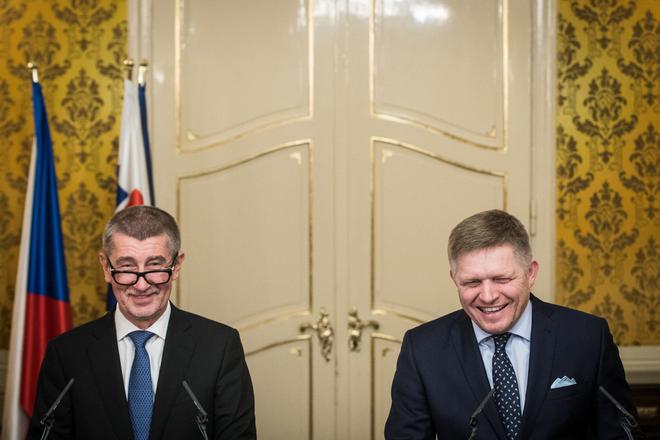Welcome to your weekly commentary and overview of news from Slovakia. Fico welcomes the victory of Babiš in the Czech elections. The passage of the constitutional amendment throws the opposition into disarray – but relations within Fico’s coalition are also less than harmonious. The trial winds up of the man accused of trying to kill Fico.
If you have a suggestion on how to make this overview better, let me know at [email protected].
Discover European Capital of Culture 2026 like a local. Our brand-new Trenčín Region guide is out now, and now you can order it for under €10 with special discount.
Fico feels emboldened after a week of disarray
This is the end of the era in which Czech politicians acted like they were “above” Slovaks – according to Slovak Prime Minister Robert Fico, speaking after the unexpectedly sweeping victory of fellow populist Andrej Babiš in the Czech parliamentary elections this weekend.
Feeling emboldened after five days of absence due to health issues that very suddenly prevented him from flying to Copenhagen for an informal summit of EU leaders to discuss the union’s drone wall project, Fico said he hoped for renewed cooperation within the Visegrad Group – meaning he hoped to team up with Babiš and Hungary’s Viktor Orbán to give a stronger voice to what he calls a “different opinion”. The V4, which groups Slovakia, Czechia, Hungary and Poland, has been politically moribund in recent years after deep divisions opened up between its members, notably over attitudes towards the EU and the war in Ukraine.
Speaking on the state TV broadcaster STVR on Sunday, Fico provided numerous examples of what a “different opinion” might look like: he asserted that the EU is no longer a peace project, but rather a military force; that there is no drone wall project to take part in; and that the war in Ukraine is a regional conflict that does not concern Slovakia. As usual, he avoided branding Russia the aggressor in the war.
Fico insists that the Party of European Socialists – the social-democratic grouping in the European Parliament – is kicking his Smer party out because he travelled to Moscow for Putin’s military parade in May. The parliament is, in fact, the most likely first venue for the new Visegrad threesome to demonstrate their revived zest to work together – within the right-wing Patriots faction that was co-founded by Babiš and Orbán and is the most likely destination for Fico’s Smer.
But the bold statements that Fico delivered on Saturday hardly reflect the reality of the past week.
Though Fico skilfully managed to divert the public’s attention away from impending tax hikes by getting parliament to pass a massive, mostly anti-LGBTI amendment to the constitution and thereby throwing the opposition into disarray, the ruling coalition has not been spared the destructive political effects either – and Fico’s own health-related absence from public life is diminishing the image that he has built for himself as a strong leader who firmly holds the reins of power.
What’s going on with Slovakia’s opposition?


